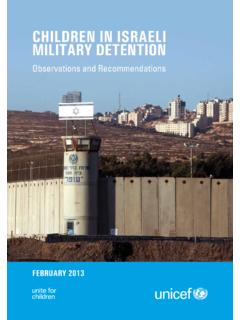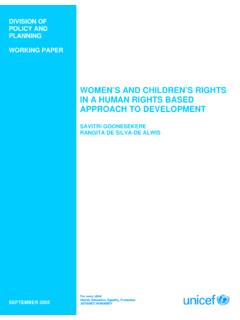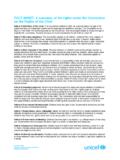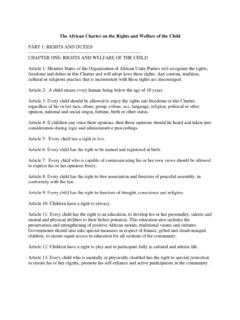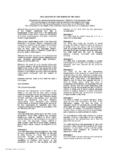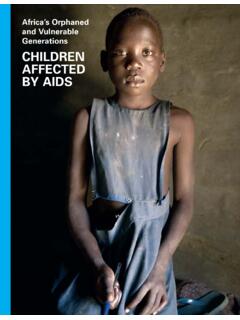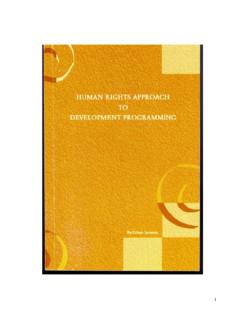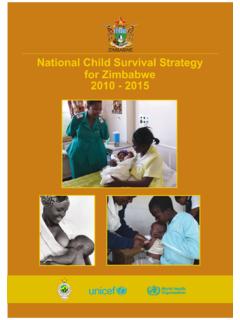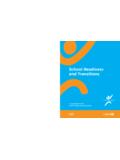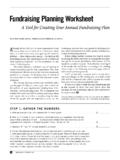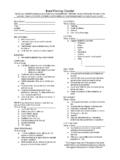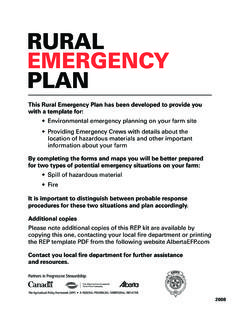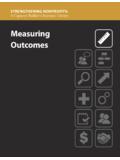Transcription of Front Cover Photo: top left: © UNICEF/NYHQ2009 …
1 Front Cover Photo: top left: UNICEF/NYHQ2009 -1736/Truls Brekke top right: unicef /NYHQ2010-1249/Cliff Volpe bottom left: unicef /NYHQ2007-1364/Giacomo Pirozzi bottom right: UNICEF/NYHQ2009 -2277/Kate Holt i United Nations Children s Fund ( unicef ), New York, 2010 This document has been prepared to provide programme and management guidance, tools and good findings, interpretations and conclusions expressed in this document are those of the author(s) and do not necessarily reflect the policies or views of text has not been edited to official publication standards and unicef accepts no responsibility for errors. The designations in this publication do not imply an opinion on legal status of any country or territory, or of its authorities, or the delimitation of Team and Acknowledgements .. iAcronyms .. iiiAbout the Advocacy Toolkit ..ivChapter 1. Understanding Advocacy in unicef .. Background: unicef s mission .. Defining advocacy for unicef .
2 Creating a common language for advocacy .. unicef s strengths and challenges .. 7 Chapter 2. Strengthening the Foundation for Advocacy .. Eight foundation areas .. 9 Foundation Area 1 Credibility ..10 Foundation Area 2 Skills ..10 Foundation Area 3 Intra-office coordination and leadership ..11 Foundation Area 4 Capacity to generate and communicate relevant evidence ..11 Foundation Area 5 Ability to assess risks ..12 Foundation Area 6 Capacity to work with children and young people ..12 Foundation Area 7 Partners and networks that form a broad base for advocacy ..13 Foundation Area 8 Sufficient resources ..14 Chapter 3. Developing an Advocacy Strategy .. Why develop an advocacy strategy? .. Nine questions for strategic advocacy ..17 Planning Question 1. What do we want? ..18 Planning Question 2. Who can make it happen?.. 28 Planning Question 3. What do they need to hear? .. 43 Planning Question 4. Who do they need to hear it from?
3 48 Planning Question 5. How can we make sure they hear it? .. 50 Planning Question 6. What do we have? .. 56 Planning Question 7. What do we need? .. 56 Planning Question 8. How do we begin to take action? .. 58 Planning Question 9. How do we tell if it s working? .. Wrapping up the nine questions: Advocacy strategy planning worksheet .. 68 Special Focus: Humanitarian advocacy .. 69 Chapter 4. Monitoring and Evaluating Advocacy .. Distinctive features of advocacy monitoring and evaluation .. Five questions for planning advocacy monitoring and evaluation .. 73 M&E Question 1. Who are the monitoring and evaluation users?.. 73 M&E Question 2. How will monitoring and evaluation be used? ..74 M&E Question 3. What evaluation design should be used? ..74 M&E Question 4. What should be measured? .. 78 M&E Question 5: What data collection tools should be used? .. Following up with next steps .. 82viiiiiChapter 5. Managing Knowledge in Ways of sharing knowledge and why it s important.
4 Policy Advocacy Community of Practice .. Innovations, Lessons Learned and Good Practices .. 84 Chapter 6. Managing Risks in Advocacy .. Identifying Risks .. Analyzing Risks .. Managing Risks .. 90 Chapter 7. Building Relationships and Securing Benefits of partnerships for strengthening advocacy .. Tips on establishing partnerships for Different ways to create addition .. Difficulties of networks, alliances and coalitions ..10 Tips for establishing a network, alliance or coalition .. Key opportunities for work with national partners ..102 Chapter 8. Working with Children and Young People in Advocacy .. Why should children and young people be engaged in advocacy? .. When should children and young people be involved in advocacy? .. How should children and young people be engaged in advocacy? .. Effective and meaningful child and youth participation ..11 Points to remember ..11 Additional tools and guidelines on child participation.
5 11 6viiiAdvocacy Team and AcknowledgementsADVOCACY TEAMThis has been an inter-divisional project, initiated and led by the Division of Policy and Practice and Private Fundraising and Partnerships, with substantial support from Evaluation Office, Office of Emergency Programmes, Division of Communications, and Programme Guidance and Direction:Richard Morgan, Leila Pakkala, Philip O Brien, Isabel Ortiz, Robert Jenkins, Stephen Adkisson, David Stewart, David Anthony, Sharmila Kurukulasuriya, Nicholas Rees, Jens Matthes, Alison Rhodes, Sam Bickel, Kseniya Temnenko, Samantha Cocco-Klein, Maritza Ascencios, Rafael HermosoAuthors:David Cohen, Neha Bhandari Karkara, David Stewart, Nicholas ReesJulia Coffman (advocacy monitoring and evaluation)Contributions, Input and Review:Advocacy Community of Practice, with particular thanks to Gordon Alexander, Abdul Alim, Zuzana Alnerova, Antonia Antonopoulos, May Anyabolu, Marta Arias, Bertrand Bainvel, David Bassiouni, Gaelle Bausson, Vanya Berrouet, Christina Bierring, Katharina Borchardt, Sara Cameron, Consuelo Carranza, Edward Carwardine, Jingqing Chai, Paula Claycomb, Andrew Claypole, Matthew Dalling, Martin Dawes, Anna Dekker, Maud Droogleever Fortuyn, Madeline Eisner, Solrun Engilbertsdottir, Mark Engman, Gaspar Fajth, Mervyn Fletcher, Rana Flowers, Julie Forder, Xavier Foulquier, Hiba Frankoul, Meg French, Cristina Gallegos, Vidhya Ganesh, Jacqueline Gaskell, Rina Gill, Bjorn Gillsater, David Girling, Joaquin Gonzalez-Aleman, Bruce Grant, Sarah Hague, Tamar Hahn, Saadya Hamdani, Olga Isabel Isaza, Christine Jaulmes, Linda Jones, Min-Whee Kang, Jyothi Kanics, Neha Kapil, Ravi Karkara, Maki Kato, Festo Kavishe, Geoffrey Keele, Michael Klaus, Jun Kukita.
6 Maya Kurtsikidze, Barbara Lambourn, Jean Claude Legrand, Jairus Ligoo, Juliana Lindsey, Karen Manda, Alison Marshall, Paul Martin, Robert McCouch, Ronald Mendoza, Susanne Mikhail, Paul Mpuga, Sheila Murthy, Geetanjali Narayan, Paulette Nichols, Alja Otavnik, Brahim Ould Isselmou, Mohamed Ould Zeidane, David Parker, Alison Parker, Raquel Perczek, Niloufar Pourzand, Harold Randall, Kate Rogers, Dan Rohrmann, Manuel Rojas Buvinich, Asako Saegusa, Monika Sanvik-Nylund, Antonella Scolamiero, Sebastian Sedlmayr, Marco Segone, Paul Sengeh, Dan Seymour, Rumishael Shoo, Christian Skoog, Susana Sottoli, Erika Strand, Aboubacar Souleymane, Teresa St uart, Glenis Taylor, Joachim Theis, Martin Thomas, Ian Thorpe, Angela Travis, Gabriel Vergara, Shani Winterstein, Lisa Wolff, Corinne Woods, Alexandra YusterEditing: Catherine RutgersDesign: Cynthia SpenceACKNOWLEDGMENTSThis Toolkit would not be possible without the rich contributions from colleagues from across the organization, most of which came from the Policy Advocacy Community of Practice, which consists of nearly 200 unicef colleagues in over 60 countries.
7 Through these discussions, the content was greatly enriched with experiences and valuable lessons on conducting advocacy work in Country Offices, National Committees, Regional Offices and Headquarters. We are also very thankful to Jim Schultz for his 9 Questions to advocacy planning, which have recently been successfully tried and tested in several unicef Biographies of AuthorsDavid Cohen is an eminent and well recognized advocate and strategist, involved in many of the major social justice and political reform issues in the US since the early 1960s. Mr. Cohen s contributions are recognized in biographies and histories of the period. He is currently a senior fellow at Civic Ventures and a senior advisor to Experience Corps, serving as an advisor to both organizations on matters of policy, programme and civic leadership. Mr. Cohen is also the Co-Founder of the Advocacy Institute, Washington, and has written considerably on advocacy, including three books, and many articles.
8 His written work has been translated into fifteen Bhandari Karkara has nearly ten years of experience in advocacy, knowledge management and communication in promoting children and women s rights with the UN, international organizations and the media. She has worked extensively with children and young people in advocating their rights using effective communication and participatory people-centered advocacy techniques. Mrs. Bhandari Karkara s work with Save the Children members at global to national level on knowledge management, communication strategies and advocacy has focused on child rights, the MDGs, health, CRC@20, protection and child participation. She has written over thirty Coffman is a leading authority in advocacy evaluation with sixteen years of experience as an evaluator, thirteen of which have focused on evaluating policy advocacy efforts. She is director of the new Center for Evaluation Innovation, a non-profit effort that is pushing evaluation practice in new directions and into new arenas.
9 She has been the lead on the Harvard Family Research Project s (HFRP s) evaluation work for much of the past decade, which has included conducting evaluations of foundation-funded initiatives and publishing The Evaluation Exchange, a nationally renowned periodical on emerging evaluation strategies and Stewart is currently unicef s Chief of Social Policy in Uganda. Between 2005 and 2010 he was unicef s Chief of Policy Advocacy where he worked on unicef s State of the World Children Report on issues ranging from excluded and invisible children, gender equality, and child and maternal health. He also founded the Social and Economic Policy working papers and policy brief series. Previously, Mr. Stewart spent six years at the Human Development Report Office (HDRO) at UNDP where he researched, wrote and presented Human Development Reports. He holds a degree in Economics from the University of Sussex and a Masters in Development Economics from the University of Rees currently works in the Policy Advocacy Unit at unicef .
10 He has worked extensively on economic and social policy and advocacy issues for the UN, economic policy think tanks and research institutes. Areas of focus include the impacts of the global economic crisis on children, child poverty and disparities, poverty reduction strategies, public services in rural areas, infrastructure investments, health and migration. He has also helped facilitate high-level advocacy for development stakeholders at the United Nations and in the UK. Mr. Rees holds a Masters degree from the London School of Association of Southeast Asian NationsC4D Communication for DevelopmentCCCs Core Commitments for Children ( unicef )CDC Centers for Disease Control and Prevention CEDAW Convention on the Elimination of All Forms of Discrimination against WomenCRC Convention on the Rights of the Child CSO civil society organizationDFID Department for International Development (UK)ECCO Episodic Communication Channels in OrganizationsEMOPS Office of Emergency Programmes ( unicef )G8 Group of Eight (Canada, France, Germany, Italy, Japan, Russia, the United Kingdom and the United States)G20 Group of Twenty (Finance Ministers and Central Bank Governors)
